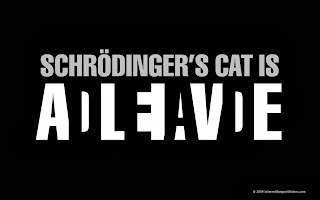I've been wondering recently about Schrödinger's Cat, that weird theoretical and philosophical experiment where the poor unfortunate creature can be both alive and dead at precisely the same moment which has clarified the position of quantum uncertainty for quite some time now, and I've come to the conclusion that old Mr S should really have picked a different animal to shove inside his semi-lethal environment because choosing a cat is simply impractical and might just jeopardise the entire theory.
For one thing, looking at the internet in general, it seems that people really, really like cats (with the exception of the people who don't of course), and threatening a theoretical Tiddles with any kind of albeit theoretical harm is seldom likely to get the majority of the general public on your side.
Then there's the theoretical pussycat itself. Have you ever tried to get a cat inside a box into which it simply did not want to be put?
It's not for nothing that the expression "It's like herding cats" was invented... Or was that "cat juggling...?"
No matter. Even if you do finally manage to wrestle your theoretical cat into its theoretical box, in my limited experience, I suspect that the horrendous loud yowls that the said cat is likely to start emitting is probably going to give any scientific observer a little bit of a clue as to the current survival status of the pussy in question.
Then there's the small matter of the box itself. If it is totally sealed, we can assume that there is some imminent risk of suffocation for the dear old moggy within which would, of course, also render the experiment moot.
"Is the cat alive or dead?" asks Otto (who's real name is Erwin) mysteriously (because I always visualise him as a kind of sinister prestidigitator in an Ali Bongo outfit).
"Well..." says the cynical student, "S'obvious, innit? S'dead..."
"How are you so sure?" replies Otto (using the stage name he never chose for himself) enigmatically, shimmying around the box waving his arms and shuffling in his gold-lamé Oriental dancing slippers...
"S'got no air in there, hassit?" replies the student, sensing his averages tumbling even as he does so.
"Oh!" sighs Otto (not his real name), as he is brought to a sudden standstill, and his waxed moustache droops to the ground as he slinks silently from the stage.
Then, of course, we get into the shadier area of which other creature might be substituted for the cat in the experiment. After all, even if we find the alternative option to be a little unpleasant, and not one of the cute poster kitties but some less than photogenic creature of general disdain, vivisection is not really the done thing any more, and poor old Otto (a.k.a. Erwin), really needs to find another creature to point his theoretical radioactive blast in the general direction of, preferably one which is okay with it, or likely to walk away anyway, like, maybe, a Cockroach.
Although, given that the Cockroach might very well be able to survive anything anyway, that rather negates the experiment too.
No, I'm afraid that the only morally acceptable thing that Otto (who was actually called Erwin, by the way, in case you didn't know that...) could do was to put himself inside the box and let nature take its course.
Or not, obviously.


